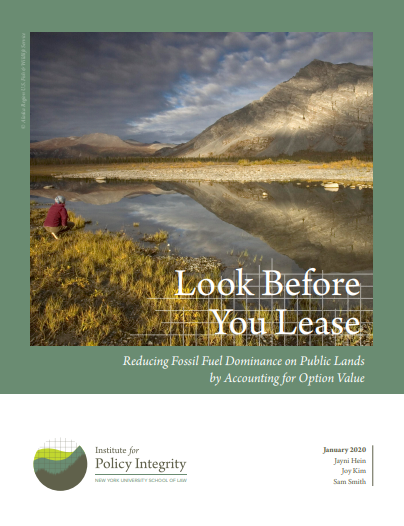-
Comments to EPA on Lead and Copper Regulation Revisions
The Environmental Protection Agency (EPA) proposed revisions to the National Primary Drinking Water Regulation for lead and copper. Our comments ask EPA to more fully monetize the benefits and better assess the significance of non-monetized benefits of the proposal. We also submitted a letter to EPA’s Science Advisory Board (SAB) summarizing our comments and encouraging the SAB to consider our points during its review of the proposed revisions.
-
Comments to HUD on Fair Housing Rule
The Department of Housing and Urban Development (HUD) has proposed to repeal and replace the 2015 Affirmatively Furthering Fair Housing rule, which sought to improve the process by which state and local governments that receive HUD funding identify and mitigate impediments to fair housing in their communities. We submitted comments detailing deficiencies in the Department’s regulatory impact analysis for the proposal. Specifically, we explain how HUD (1) ignores benefits of the 2015 rule that will be forgone under the proposed replacement, and (2) overestimates cost savings that will result from the proposed replacement.
-
Comments on the Transportation and Climate Initiative
The Transportation and Climate Initiative called for public input on a Draft Memorandum of Understanding, which lays out a proposal for a Northeast and Mid-Atlantic regional program to establish a cap on carbon pollution from transportation and invest in further emissions reductions, cleaner fuels, and infrastructure. We submitted comments on the proposal suggesting that TCI adjust its definition of affected fuels, set the emissions cap to better reflect external damages from carbon emissions, implement the banking of allowances carefully, and verify that all offsets are real, permanent, and additional.
-
Comments to OMB on Marginal Excess Tax Burden
The Office of Management and Budget (OMB) requested input on the possibility of including an estimate of the social cost of taxation, known as marginal excess tax burden (METB), in regulatory-cost accounting for transfer rules under Executive Order 13,771. We submitted comments responding to OMB claims and providing further information about METB.
-
Fuel-Economy Standards, Corporate Penalties, and a Very Costly Rollback
The mistake of setting corporate fuel-economy penalties just a little too low can be magnified by automakers’ decisions to produce millions of cars with worse fuel-economy. And the Trump penalty appears to be way too low to motivate compliance. Here’s a breakdown of the reduced penalty and how it will likely affect cars, consumers, and our climate.
-
Comments to SEC on Shareholder Proposal Regulations
The Securities and Exchange Commission (SEC) proposed a rule that would limit investors’ ability to propose shareholder resolutions for a vote by fellow shareholders. The rule would raise requirements on the amount of stock required to be owned, impose requirements for the length of time the stock must have been held, and make it harder to resubmit resolutions that had failed to reach majority support in prior years. We submitted comments critiquing the rule, which will limit shareholder monitoring and likely have an outsized impact on shareholders’ role in environmental oversight.
-
Comments on Medicaid Fiscal Accountability Regulation
The Centers for Medicare and Medicaid Services at the Department of Health and Human Services proposed a rule that would likely reduce Medicaid funding, provider payments, and beneficiaries’ access to care. We submitted comments explaining serious flaws in the agency’s analysis, which fails to quantify funding reductions and assess the health impacts of reduced care.
-
Amicus Brief on Dust-Lead Hazard Standards
The Environmental Protection Agency (EPA) finalized a rule revising standards for lead found in dust on floors, window sills, and in soil. Our amicus brief critiques the rule, which forgoes net beneficial options in favor of weaker standards that will cause significant harms to public health.
-
Amicus Briefs on Homeland Security’s “Public Charge” Rule
In August, the Department of Homeland Security finalized the “public charge” rule, which seeks to deny lawful permanent residency to immigrants who have participated in public assistance programs like Medicaid, the Supplemental Nutrition Assistance Program, and the Section 8 housing voucher program. Multiple federal district courts have since enjoined the rule from taking effect and Policy Integrity filed amicus briefs supporting those injunctions on appeal. Our briefs explain how the Department failed to meaningfully assess many of the substantial social costs of the large-scale disenrollment from public assistance programs that will result from the rule, and also failed to identify any significant social benefits from the rule.
-
Look Before You Lease
Reducing Fossil Fuel Dominance on Public Lands by Accounting for Option Value
While the Trump administration’s goal of “energy dominance” has increased the public lands available for oil and gas development, no effort has been made to modernize the leasing system, even in the face of climate change. Our report explains how option value—which accounts for the informational value gained by delaying leasing decisions—can and should be factored into the Bureau of Land Management’s land use planning processes. Accounting for option value at multiple stages of the land use planning process would significantly improve BLM’s public lands stewardship, better protect the environment, and regain some of the economic and strategic advantages it has ceded to private developers. The report also describes case studies where BLM’s failure to consider option value has led to costly litigation and missed opportunities.
Viewing recent projects in Consumer and Healthcare Protection







